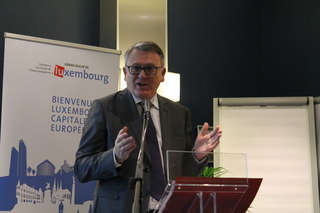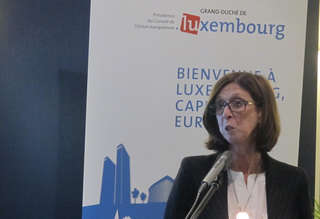On 29 October 2015, the Minister for Labour, Employment and the Social and Solidarity Economy, Nicolas Schmit, and the Minister for Equal Opportunities, Lydia Mutsch, took part in a conference on individual taxation and employment organised in the Grand Duchy as part of the Luxembourg Presidency of the Council of the European Union.
Several European tax and social policy experts took stock of the current situation regarding individual taxation and of the degree of individualisation in the Member States. They studied the link between the degree of individualisation and its repercussions on employing women in quantitative and qualitative terms and looked at the characteristics of the transition phases, so as to determine the factors for creating a favourable tax environment for equality between women and men.
In his introductory speech, Nicolas Schmit stressed the importance of a taxation system which fully takes into account the development of the role of women in society. Lydia Mutsch called for work to be remunered in such a way that it encourages both men and women to join the labour market, and called into question the legal taxation framework based on marriage and on the principle of a main breadwinner in terms of household income.
Ensuring that the taxation system fully takes into account the development of the role of women in society

The Minister stressed the importance of ensuring that the joint taxation system as exists in Luxembourg also fully takes into account the development of the role of women in society, in particular regarding the world of work. He then pointed out that in the EU, "out of 28 countries, only four have a joint taxation system, while three have what is called a ‘splitting’ system, and France applies a family quotient system".
The idea behind the individualisation of income taxation is according to him different from that of the joint income taxation system, which is applied to "a kind of consumer unit which is the household" and which fits into a concept of the household where there is a single breadwinner, worker, wage-earner, or an individual who earns the lion's share of the income".
According to Nicolas Schmit,it is difficult to establish "an absolute correlation" between the type of taxation and the rate of employment. "In countries that practise individual taxation, in particular the Nordic countries, the employment rate for women is higher. In Germany however, where there has been no fundamental change in the joint income taxation system with splitting, the employment rate for women has increased substantially in recent years", the Minister pointed out, whereas in specific Southern European countries applying the individualisation of income taxation, like Italy, Greece and Malta, employment rates for women are "very low".
"But the impact is clear", the Minister stressed, before mentioning other factors that influence the rate of employment of women, such as child support systems, an aspect which he believes is "no less important than the taxation component". He also mentioned the need for childcare to be "an acceptable cost", and underscored the importance of the deductibility of childcare costs in taxation.
Finally, the Minister drew attention to the fact that taxation "influences" the choices of people working full or part-time. As a rule, it is women who undertake most part-time work, so that their chances of promotion are, as a result, reduced, the Minister pointed out. Furthermore, "part-time workers will get a partial pension", he said, which according to him is "even more problematic" since today, divorces have increased significantly. The "significant" discrepancy between the pensions of men and women is according to him also linked to wage differentials and to the fact that women often have "a more incomplete career".
"Hence the importance of this conference, which should enable us to get a better understanding of all these aspects and to prepare the ground for adapting our taxation regime so that it permits more equality, better taking into account the work of women and men, and greater fairness in taxation", the Minister concluded.
Women's increasing participation in the job market is too often depending on their possibility of balancing work and family life

In her address, the Minister stressed that the increasing participation of women in the job market and the greater presence of women in decision-making, are also "too often depending on their possibilities of balancing work with family life".
The Minister welcomed the discussions that had taken place at the joint-meeting of EU Employment Ministers and Equal Opportunity Ministers on 17 July 2015 in Luxembourg, where the delegates had exchanged views on which paths to take in order to better meet the needs of men and women, and for achieving a better balance between family and professional life. "This is a first step towards taking the interests of both parents, women and men into consideration while new forms of work organisation or ways of caring for children and dependent persons are being introduced", she said.
Lydia Mutsch regretted the fact that childbirth is "often perceived as the sole stumbling block to more women being in the job market and in decision making". According to her, there are other factors that influence women's career development, such as professional choices, pay inequality, social and family policies, more precarious forms of employment and taxation policies, to name a few.
The Minister emphasised that a modern society should "be based on fair sharing out of tasks between men and women in all areas of life" and outlined Luxembourg's initiatives on the matter: the Luxembourg Government had actuallyintroduced equal opportunities between men and women as a guiding principle of its 2013 government programme. The programme in particular foresees that "the Government will analyse the options of implementing individual taxation for legal and natural persons", she said.
At European level, Lydia Mutsch also mentioned the Europe 2020 strategy, which aims to stimulate intelligent, sustainable and inclusive growth by placing emphasis on job creation and poverty reduction. Yet "these objectives cannot be achieved without tapping into the potential of the female labour force", said the Minister, pointing out that the targeted 75 % employment rate for the 20 to 64 age group cannot be achieved without the increased involvement of women in paid work. And according to her, "choices made in taxation matters can encourage or even actively discourage carrying out a paid activity".
Remunerating work so that it encourages both men and women to join the labour market is an "essential priority", said Lydia Musch. Furthermore, given new lifestyles and the diversity in the make-up of households, it is time to "call into question the legal taxation framework that is based on marriage as a very stable institution and on the principle of a single breadwinner per household". This system, which the Minister believes is counterproductive to the extent where it discriminates, at least indirectly, against married women, "risks penalising married women who carry out a paid activity, particularly if their income is less than that of their spouse".
For Lydia Mutsch, the conference "will not only fuel debates on taxation reform in Luxembourg, but will also enrich national and international debates on male and female equality, as well as the legal and social framework to be put in place in order to ensure better sharing of responsibilities".

